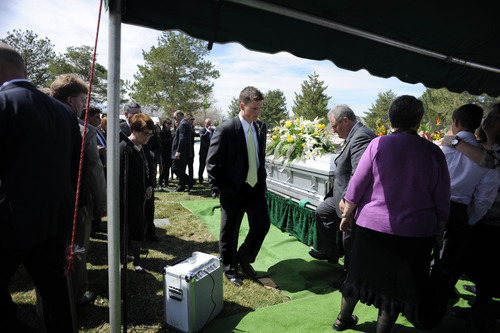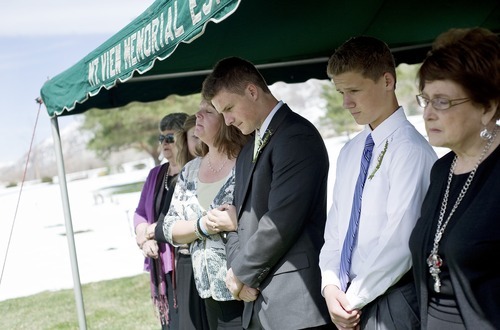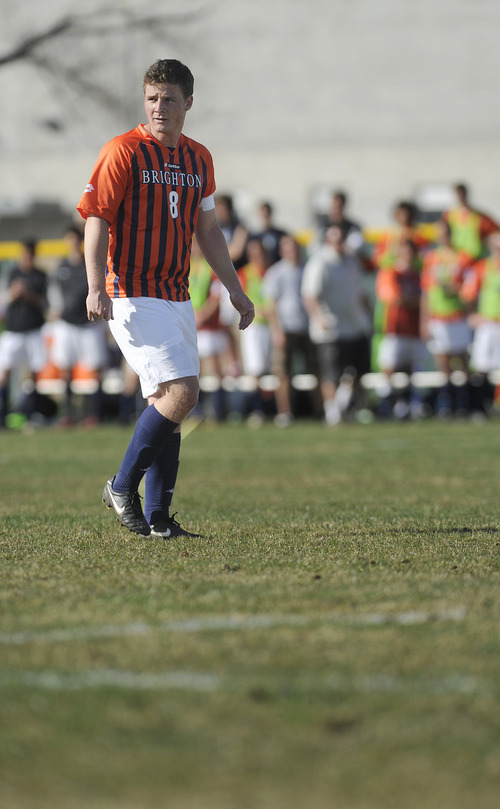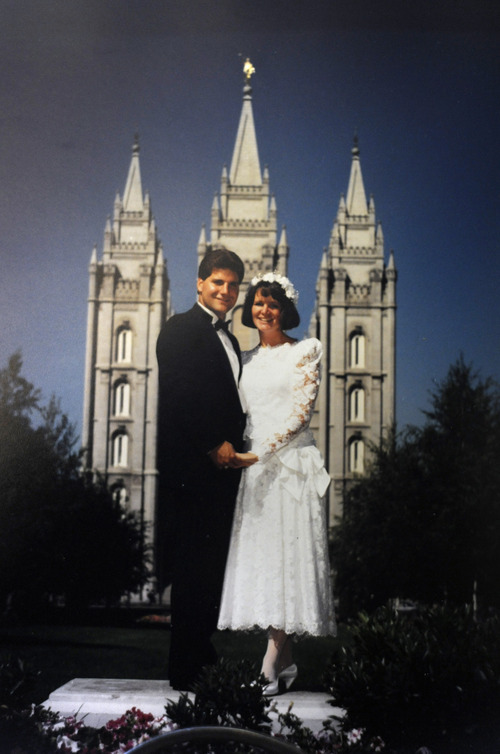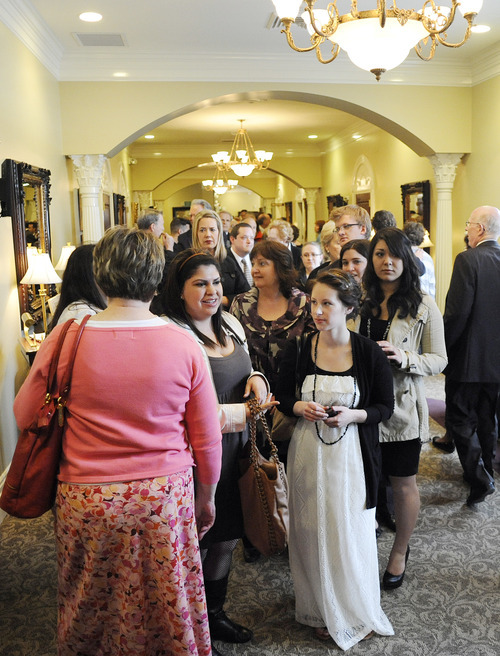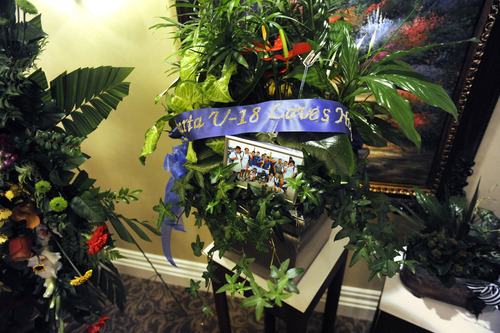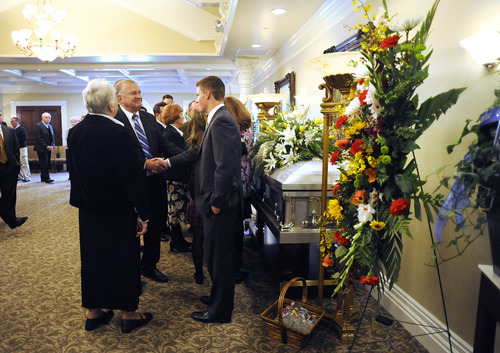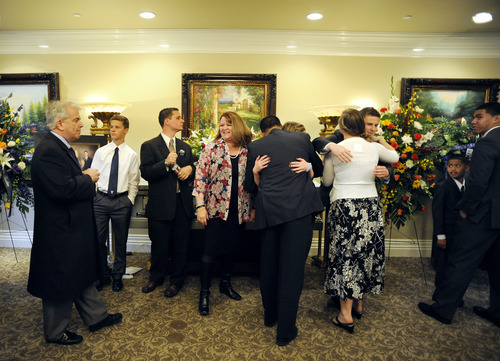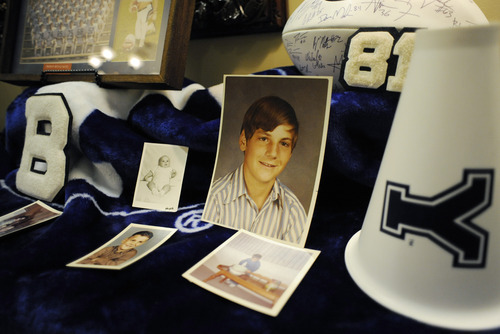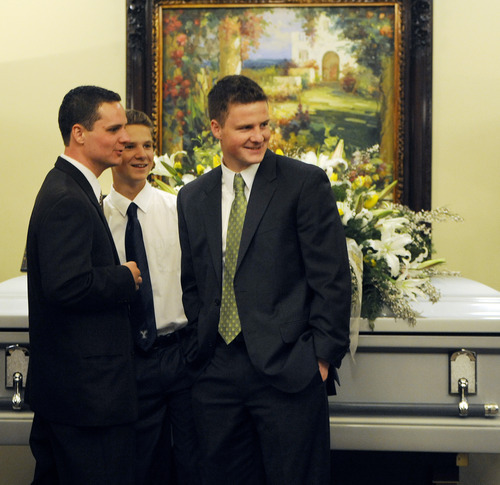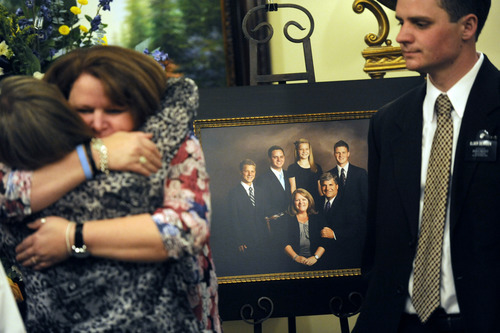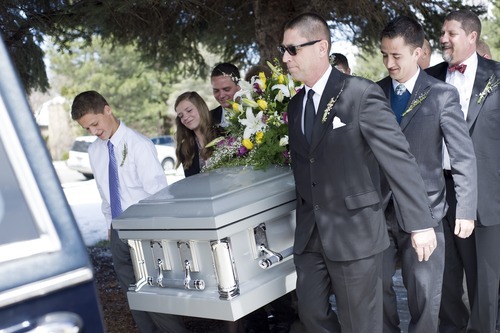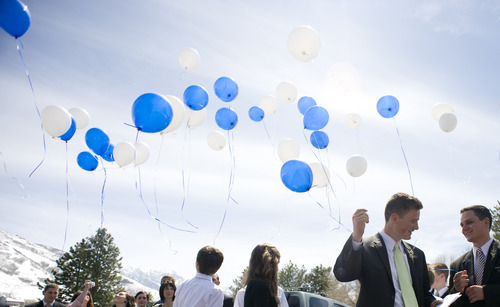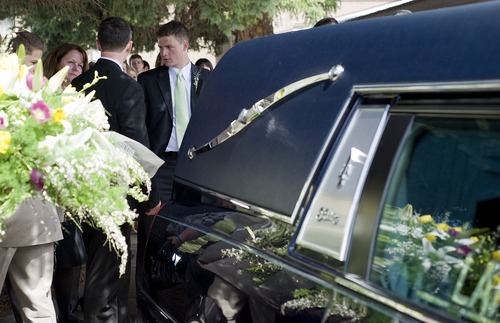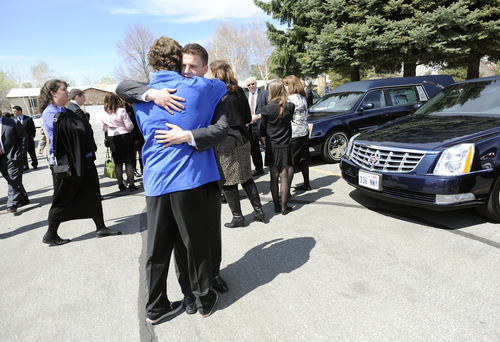This is an archived article that was published on sltrib.com in 2011, and information in the article may be outdated. It is provided only for personal research purposes and may not be reprinted.
As his teammates dart around him, Jerry Dearden slips free of his defender and sprints hard toward the goal. He aims himself at the perfect cross a teammate has kicked in front of the net.
But his header is off target.
Soon, he sees another opportunity, and Jerry zips a low shot to the corner of the goal. Jordan's goalkeeper makes a nice save.
Gosh dang it!
The Brighton midfielder hears his name as he jogs downfield. On the sideline, a teammate waves his arms.
"Sub!"
Jerry will re-enter shortly for the Bengals, annually one of Utah's best high school soccer teams. Still, he looks down at the block letters on the band on his left arm. His father's initials. Jerry's teammates wear them, too, to honor Hugh Dearden.
So, why, today of all days, is Jerry being taken out at all?
Don't sub me out. I need to be out there right now. I need to be out there because this could be the last time my dad sees me play.
Across the field, a black SUV is parked along its edge. Hugh rests inside, while Jerry's mother, Diane, paces outside the car.
Jerry waits anxiously for a coach to put him back in the game.
What if I miss an opportunity while I'm sitting here?
Jerry doesn't want to let his father down.
Hugh has hardly left his bed during the past week, but he insisted on watching today's game. His doctors have stopped using words such as "months" and "weeks."
Now, father and son measure the time they have left together in soccer games.
—
"More urgency" • Peering from the SUV's passenger seat, Hugh, 48, tugs at oxygen tubes running to his nose and rubs his bald head. He has a headache. He focuses intently.
It is April 1, and he knows he won't see Jerry play for Brigham Young University next season. He savors what he expects will be his final opportunity to watch his son play the game they both love.
"More urgency," he says. "Just go at it a little harder."
After every game, Jerry listens patiently to his father's assessment of what he did incorrectly. Then he goes to his mother, who reassures him, "Your dad said you did really good."
Hugh was once an athlete himself. He starred in baseball and football at Brighton. They didn't have soccer then. But as Jerry learned the game, so did Hugh.
Today, Diane is outside, guarding Hugh, greeting visitors to his window and shepherding them away once he begins to tire.
This morning, visitors and nurses kept coming to their Cottonwood Heights home.
"I don't want any more visitors," Hugh finally said. He needs a three-hour nap to get ready for the game.
He sighs when Jordan's diving goalkeeper blocks Jerry's shot.
"Making the keeper look like a pro," he says.
Jerry doesn't score, but Brighton wins 2-1. Halfway through the second half, Hugh, so attentive just an hour earlier, tips his seat backward and falls asleep.
—
A shared love • They grew to love soccer together — Jerry, as a freckle-faced adolescent, annoying other children with his fiery competitiveness, and Hugh, as a soccer dad who, when he tired of chirping at referees, became one.
As a 7-year-old, Jerry nagged his father to let him ride along to work.
Finally, Hugh loaded Jerry in the car and they drove to Utah County, where Hugh worked as a billboard salesman. Along the way, he dropped Jerry off at a soccer camp at BYU.
At the end of the weeklong camp, an instructor pulled Hugh aside.
Jerry was good. Better than most of the other youngsters.
Hugh and Diane signed Jerry up for competitive soccer and he excelled, always with his parents right there.
But Jerry is one of four kids, with an older brother and a younger brother and sister, who are twins. They all had their own pursuits. Hugh loves listening to Daren play piano and going to Libby's and Conner's own soccer games. Yet when events conflict and Diane and Hugh have to split up, Hugh is always watching Jerry.
—
A familiar loss • Hugh knows what Jerry will go through once he dies. His own father died when Hugh was 18.
Melvin Dearden was 53 in the spring of 1981, when an aggressive form of prostate cancer took his life.
The month after Melvin died, Hugh led the softball team of Butler Ward 19 to the area championship.
On that June day, while teammates tackled one another on the infield, sending gloves and caps flying, Hugh sneaked away. Not until Bishop Craig Hanson tried to interrupt the mayhem for a team photo did anyone notice he was gone. Hanson looked around for the slugger.
When Melvin died, Hanson had wrapped his arm around Hugh at his father's bedside.
Melvin was a proud dad. He would confide in Hanson: "Boy, that Hugh sure is a ballplayer."
Hanson finally spotted Hugh in the bleachers of an adjacent ballfield, huddled in the farthest, highest corner.
As Hanson approached, he saw Hugh, his arms wrapped around his head. Hugh was weeping.
"I'm just so sorry that my dad wasn't here to see this," Hugh sobbed. "He's always been my biggest fan."
Finally, Hanson led Hugh down the bleachers.
"We need to get a picture," Hanson said.
The rest of the team was already gone, so Hugh sat between his two coaches, Gary Cahoon and Hank Moore. He forced a smile. Hanson promised him his father had, in fact, been watching.
—
Disease strikes again • Melvin would pass to Hugh more than just an unspoken promise.
At age 45, Hugh learned he had prostate cancer, too. Now, Jerry and his two brothers will live wondering whether they are next.
The 2008 diagnosis began for the Deardens a three-year roller coaster of surgeries, treatments and frantic trips to hospitals.
Doctors described it as the most aggressive form of the cancer they had seen. Hugh went to three physicians before finding one who even thought it was operable. Still, the tumors kept coming back and spreading.
Last fall, Jerry was named the state's best club soccer player after leading Sparta United to the state championship game. When he accepted his award, Hugh was there, smiling, with a full head of hair. By the time Brighton's season began in March, he was bald from the chemotherapy.
—
Welcome respite • Even through his treatments, Hugh didn't change. He watched games critically, to the point where Diane wouldn't sit with him. He watched as a competitive athlete, but also as a referee. He knew soccer now, and his criticisms were reasoned and, usually, accurate.
Hugh and Jerry took a course in refereeing together. For Jerry, then 13, it was a good way to make money. For Hugh, it became therapy in his most unsettling days. It became an opportunity to put his disease on the sideline for a while.
It is March 18, and Hugh stands along the field at Judge Memorial, pulling on his yellow referee's jersey for the first time this spring. He double-checks that he has everything. He slides his yellow and red cards into his breast pocket.
Hugh is thick and tall, dwarfing many of the players around him. Even now, his withered movements reflect those of a once-great athlete.
He is a good referee. Officials, players and coaches agree on that, if nothing else. He is attentive and careful. He engages the athletes, chatting and joking.
But today, as he tries to keep up with the players from Judge Memorial and West high schools, something is wrong.
Three days ago, doctors told Hugh he had tumors on his brain. Today, his body isn't moving with his legs. As he stares down the field, his vision goes in and out of focus.
Jerry and a friend are having dinner at a restaurant with Diane when she receives a text message from Hugh.
"Had to quit at halftime," Hugh writes. "I couldn't keep up. I want to just cry now."
Diane hurries out of the restaurant and drives to Judge Memorial to pick up Hugh, who is sitting on the edge of the field. As he and Diane walk to the car, he puts his arm around her and breaks down.
He knows he will never referee again.
—
"Go be with your dad" • The night before Hugh dies, Jerry stands alone against the rail of his father's hospital bed.
He looks his dad in the eye and promises to take care of his mother and the twins.
They talk about the things that bond them. They talk about soccer.
Even though he won't be at any more games, Hugh assures Jerry he will be watching.
The next day, April 4, a dreary Monday, Jerry quietly joins his family in Hugh's room at Huntsman Cancer Institute in Salt Lake City.
"We love you," Jerry says.
"Go be with your dad," Diane says.
Hugh opens his eyes, looks at each of his kids one last time. Then his eyelids droop.
Diane slips away to call Daren. Jerry's 20-year-old brother is serving a mission for The Church of Jesus Christ of Latter-day Saints in Mexico. Jerry follows.
As he listens to his mother tell Daren their father is dead, Jerry's mind drifts back to his game three days earlier.
The fact that he didn't score haunts him.
"Was dad disappointed?" Jerry asks his family later.
Hugh had put in so much effort to be at the game. Maybe, Jerry agonizes, he didn't put in enough effort for his dad.
It was the last event of Hugh's life. Jerry wonders if it should have been.
"Would his time have been lengthened if he didn't use his energy to go to my game?" he asks.
Family members tell Jerry he is unfairly burdening himself. Leaving the house for the game was neither an accelerator nor an inglorious last gasp for Hugh. It was a release.
—
After death comes life • Standing in the church that sits just across the street from his family's home in Cottonwood Heights, Jerry clenches his jaw and blinks back tears. He stares at the long, silver box that holds his father. They will bury Hugh today.
It's April 11, and Jerry's feet ache. He would prefer to be in Nikes rather than rigid dress shoes. He has greeted 700 people and nodded solemnly through 700 expressions of "I'm so sorry."
Hugh's casket sits along a bank of windows. It's the nicest day since Brighton beat Jordan, and sunlight pours into the church.
When the doors to the small side room close, Hugh's brother, Bruce, prepares to offer the family prayer. Blooming lilies and tulips are moved to one end of the casket, and the other is slowly opened.
Jerry slips away from his mother and walks awkwardly toward his father. Everyone is watching him. He reaches into his jacket and pulls out a thin, bright-orange rectangle, hardly bigger than a playing card. He takes a final step forward, places his hand on his dad's chest and silently slides the card — Hugh's red card — into his father's breast pocket.
The casket is wheeled out of the room and into the chapel, which overflows with people. They have packed the gymnasium at the rear of the chapel, which cannot hold everyone.
On tables along the wall outside the chapel, there is a football team picture from Hugh's days at Brighton, an old baseball cap and photos of family trips.
There is a framed photo with muted color. An 18-year-old Hugh sits on a bench between two coaches, wearing a blue jersey and a red-and-white cap. His shaggy hair sticks out.
He has mustered an open-mouthed, half smile, and, for the first time in his life, he has facial hair. It's a wispy beard, thicker at the chin than on the sides. His eyes are red. He looks as if he has been crying.
Jerry walks past all of it, into a future without a dad.
He will go to BYU in the fall. He will play soccer. Even though Hugh won't there, he will be watching. He promised.
Today, Jerry will stand at the pulpit and speak briefly to 700 strained faces. He will help carry that long, silver box across a snow-patched field to his father's grave.
After a long night, he will return in the morning with Daren and Diane to the grave site. They will pray and cry, then they will take Daren back to the airport. They must be quick, though.
There's a game tomorrow afternoon.
Brighton soccer
As of Friday, the Brighton soccer team held a record of 8-0-4, with three games remaining on its schedule. The Bengals are in position to grab Region 4's No. 1 seed to the state tournament. Jerry Dearden has scored two goals for the Bengals, who won back-to-back 5A championships in 2008 and 2009.


